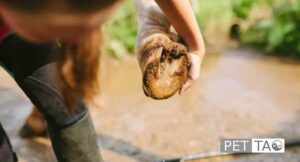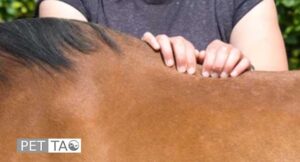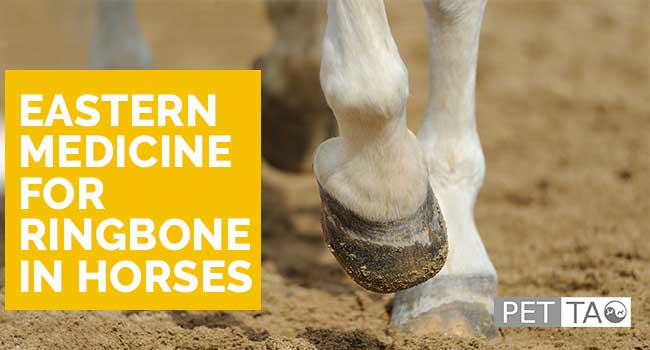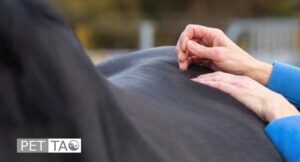What Is Ringbone in Horses?
Ringbone is a condition that affects horses and is characterized by the development of bony growths around the pastern or coffin joints in their legs. These growths, called osteophytes, form along the edges of the joint and can cause pain, lameness, and reduced range of motion.
There are two types of ringbone: high ringbone and low ringbone.
High ringbone occurs in the pastern joint, which is located between the long pastern bone (second phalanx) and the short pastern bone (third phalanx).
Low ringbone occurs in the coffin joint, which is located between the short pastern bone and the coffin bone (distal phalanx).
Causes
Ringbone has various causes, including:
- trauma
- repetitive stress on the joint
- poor conformation
- genetic predisposition
- chronic inflammation
It is more common in older horses but can also affect younger ones.
Symptoms

- lameness
- swelling
- heat
- pain
All symptoms occur in the affected joint.
The severity of the lameness varies depending on the extent of the bony growth and the inflammation present.
In some cases, the horse may display:
- a stiff or shortened stride
- difficulty in turning
- reluctance to move
Diagnosing ringbone typically involves a thorough examination by a veterinarian, including:
- a physical examination
- evaluation of the horse’s gait
- diagnostic imaging like X-rays or ultrasound
Standard Western Treatments for Ringbone in Horses
Standard Western treatment options for ringbone aim to manage pain, reduce inflammation, and preserve joint function.
They may include:
- rest
- non-steroidal anti-inflammatory drugs (NSAIDs)
- joint supplements
- corticosteroid injections
- physical therapy
- corrective shoeing
Surgical options like joint fusion may be considered in severe cases where conservative treatment fails.
Ringbone is a progressive condition. In other words, it tends to worsen over time.
However, with appropriate management and care, affected horses can often maintain a good quality of life.
They can also continue to participate in certain activities, depending on the severity of the condition.
It’s crucial to consult with a veterinarian for an accurate diagnosis and to develop an appropriate treatment plan for your horse’s ringbone.
Five Eastern Options for Ringbone in Horses
Eastern medicine, or TCVM (Traditional Chinese Veterinary Medicine), is a holistic approach to veterinary medicine that incorporates acupuncture, herbal medicine, dietary therapy, and other modalities.
When treating ringbone in horses, a TCVM-trained veterinarian may employ various techniques and therapies to address the underlying imbalances and promote healing.
Many Eastern-trained veterinarians use TCVM options combined with alternative treatments like Adequan and Legend injections to help ringbone in horses.
Below are some common approaches TCVM uses for treatment.
 1. Acupuncture
1. Acupuncture
Acupuncture involves the insertion of thin needles into specific points on your horse’s body to stimulate energy flow and restore balance.
Acupuncture helps alleviate pain, reduces inflammation, and improves circulation around the affected joints.
2. Herbal Medicine
TCVM veterinarians often prescribe specific herbal formulas tailored to the individual horse’s condition.
From a Western perspective, herbal formulas help reduce inflammation, manage pain, promote joint health, and support overall healing.
However, from an Eastern perspective, a trained vet wants to do things like:
- balance Qi and Blood
- resolve Stagnation, Dampness, and Heat
- clear Heat-Toxin
- balance Yin and Yang
An Eastern-trained vet will choose a particular formula to rebalance the underlying imbalances in your horse that led to the formation of ringbone.
In addition, most TCVM formulas contain herbs with anti-inflammatory and analgesic effects. So, they will help your horse feel better as he/she returns to balance.
Some examples of TCVM herbal formulas for ringbone in horses are:
Of course, you’ll need the help of a TCVM-trained veterinarian to find the appropriate herbal formula for your horse’s particular patterns and deficiencies.
3. Food Therapy
A TCVM-trained veterinarian will help you with dietary adjustments to support your horse’s overall health and reduce inflammation.
TCVM food therapy, or dietary therapy, uses specific foods and dietary modifications to support your horse’s overall health and address imbalances in the body.
Eastern vets often suggest specific foods to bring your horse back into energetic balance.
Or, they may recommend supplements to enhance joint health, such as omega-3 fatty acids or glucosamine/chondroitin supplements.
4. Tui-na Massage and Manipulation

It involves specific techniques to promote circulation, reduce muscle tension, and improve joint mobility.
Tui-na helps alleviate the pain and stiffness associated with ringbone in horses.
Some TCVM-trained vets teach their clients Tui-na techniques to use on their horses at home.
5. Topical Treatments
TCVM veterinarians also often recommend topical TCVM herbal liniments like Relief Salve or poultices to reduce inflammation and provide localized relief.
Combining topical treatments with an ingested herbal formula gives your horse double the benefit.
Need Help Finding a TCVM-Trained Veterinarian?
A good resource is the American Holistic Veterinary Medicine Association’s Member List. Look for vets who practice acupuncture, work with Chinese herbs, or designate themselves as TCVM practitioners.
If you still have trouble finding a vet in your area, another option is getting an Eastern Medicine (TCVM) telemedicine consultation.
If you get a TCVM telemedicine consultation with one of our veterinarians, you’ll get personalized recommendations specific to your pet, including:
- Food Therapy Recommendations
- TCVM Herb Recommendations & Veterinary Authorization
- Supplement Recommendations
- Alternative Medicine Recommendations
- Answers to Your Questions
You can learn more about our founding veterinarians and their expertise and/or schedule by visiting their websites:
- Marc Smith, DVM, MS – Natchez Trace Veterinary Services
- Casey Damron, DVM, CVA – White Oak Animal Hospital
Sources:
- Ringbone. (n.d.). https://vaequine.com/equine/ringbone/
- Overview of Ringbone in Horses (2020, February 20). SteinbeckPenEq. https://www.steinbeckpeninsulaequine.com/post/overview-of-ringbone-in-horses
- Cva, L. a. D. (2019). Ringbone in Horses – Diagnosis & Treatment — Irongate Equine Clinic. Irongate Equine Clinic. https://www.irongateequine.com/education/2017/8/24/ringbone
- Ms, H. X. D. P. (2017). TCVM for Lameness in Horses – Diagnosis and Treatment. IVC Journal. https://ivcjournal.com/tcvm-for-lameness-in-horses-diagnosis-and-treatment/









